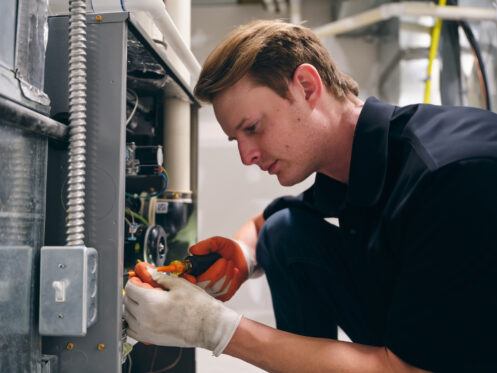Are you trying to decide whether your home in South Jersey would benefit more from a heat pump or furnace? Each type of system comes with its own set of pros and cons. Understanding the benefits and downfalls of each system is crucial to helping you make a well-informed decision that not only improves the comfort of your home but also reduces your heating bills. To help you make the best choice, we put together this helpful guide on the pros and cons of heat pumps and furnaces.
Furnace Pro: Long Lifespan
With proper maintenance, furnaces can reliably heat a home for up to 20 years or longer. They are an investment in home comfort that pays for itself over time thanks to the long lifespan of its essential components.
Furnace Pro: Cost-Effective
Modern furnaces are so efficient because they turn a large percentage of the fuel’s energy into heat, making them one of the most cost-effective heating options for households. Furnaces, especially ones that run on natural gas, are a great way to save money on heating costs. They are also cost-effective because they require minimal maintenance, as long as homeowners stay on top of their annual service appointments.
Furnace Pro: Versatility
A furnace’s ability to work with many fuel types is one of its most distinctive features. This versatility gives homeowners the freedom to pick from a variety of fuel sources: electricity, propane, oil, or natural gas. With this flexibility, homeowners can choose a heating system that works for them in terms of price, environmental impact, and fuel availability in their area.
Furnace Con: Carbon Emissions
The combustion of fossil fuels in furnaces results in the emission of carbon dioxide into the atmosphere. For those looking for greener heating solutions, this is a major worry. Modern furnaces are more efficient and produce less pollution than their predecessors, but the environmental impact of burning fossil fuels is still significant.
Furnace Con: Required Ductwork
There are a number of factors that affect the practicality and affordability of installing a furnace, including the age of the house and whether or not it has ductwork. Ductwork installation, which is necessary for homes without preexisting ducts, can be an intrusive and expensive operation. Ductless mini-split systems and radiant heating are two alternatives that homeowners can consider in these situations.
Furnace Con: Dependence on Fuel Availability
Even though furnaces can work with a variety of different fuel types, some regions may have an abundance of certain fuels, while others may have a severe shortage. The availability of fuel can impact the cost-effectiveness of a furnace and even restrict homeowners’ options. Those who use less prevalent or more costly fuel sources, such as oil or propane, may find it more difficult to consistently and affordably run their furnaces when fuel prices fluctuate.
Heat Pump Pro: Lower Operating Costs
Heat pumps have reduced running costs when compared to conventional heating and cooling systems, which is one of their main advantages. Using electricity as a power source, heat pumps extract heat from the earth or air and transfer it to a building. This approach reduces energy usage since it is more efficient than burning fuel to generate heat. For homeowners seeking to reduce their heating and cooling costs in the long run, heat pumps are a cost-effective option because of the substantial savings they can provide on energy bills.
Heat Pump Pro: Dual Functionality
With heat pumps, you get heating and cooling in one convenient package, which is a major perk. During the winter, they draw heat from the earth or air outside and send it inside to keep the house warm. In contrast, as the weather becomes warmer, heat pumps work in reverse to provide air conditioning by drawing heat from within and releasing it outside. With its two-in-one design, you won’t need a separate HVAC system anymore, which will greatly improve your home’s energy efficiency and make temperature management a breeze.
Heat Pump Pro: Reduced Carbon Emissions
Heat pumps produce less carbon emissions than conventional heating systems. These systems are becoming even more environmentally friendly as the power system integrates more renewable energy sources. This is because heat pumps mostly rely on electricity to transfer heat. For homeowners concerned about their carbon footprint, heat pumps are a green and responsible option since they reduce emissions of greenhouse gases. This is in line with the current trend toward eco-friendly activities.
Heat Pump Con: Initial Cost
Heat pumps can be more costly when compared to more conventional heating and cooling options. Because of the greater initial investment, some people may be hesitant to choose a heat pump. This is particularly applicable if they are in a scenario where short-term financial concerns are more important than long-term operational reductions in energy expenses.
Heat Pump Con: Climate Dependency
External temperatures affect the efficiency of heat pumps, which means that they are less efficient in areas that experience extremely cold temperatures. This is because when the weather becomes cold, heat pumps struggle to draw enough heat from the earth or air to keep you warm in the winter. During colder months, this dependence can greatly reduce your home’s heating efficiency. You may even need to install and use supplemental forms of heating.
Heat Pump Con: Complexity
For heat pump systems to function at their best, knowledge of the refrigeration cycle and other heat transfer processes is essential. If homeowners and technicians want to install and maintain the system correctly, they need to know all the ins and outs of the system. Because of this intricacy, heat pump systems may be more expensive to install and maintain, and it can be difficult to locate competent technicians who have the training to fix them.
How to Decide Between a Heat Pump or Furnace
When deciding between a heat pump and a furnace for your house, it’s important to think about your climate, your budget, and your personal preferences. First, you should take a look at the weather where you live. Heat pumps work well in mild settings where the temperature doesn’t often drop below freezing, whereas furnaces are better suited to colder areas.
Next, figure out how much money you have and how much each system will cost initially. Although heat pumps sometimes require a greater initial investment, they may end up saving money on utility bills in the long run. Since heat pumps don’t need as much ducting as furnaces, they may be a better fit for properties that do not already have this kind of infrastructure in place.
Laury Heating Cooling & Plumbing is here to help you in South Jersey decide whether your home will benefit from a heat pump or furnace. We also help homeowners with AC installations and repairs, plumbing services, and more. Give us a call today to learn more about the pros and cons of heat pumps and furnaces and to schedule an appointment.



